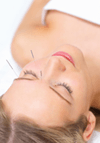Randi Fredricks, Ph.D.
 Depression is a mood disorder characterized by both physical and psychological symptoms that can be detrimental to normal daily functioning. Research into depression treatment has found that depressed individuals often suffer from poor sleeping habits, crying spells, anxiety, worry, poor memory, inability to concentrate, body aches, stomach disturbances and a lack of interest in activities previously enjoyed. In extreme cases, individuals become helpless, hopeless, and even suicidal.
Depression is a mood disorder characterized by both physical and psychological symptoms that can be detrimental to normal daily functioning. Research into depression treatment has found that depressed individuals often suffer from poor sleeping habits, crying spells, anxiety, worry, poor memory, inability to concentrate, body aches, stomach disturbances and a lack of interest in activities previously enjoyed. In extreme cases, individuals become helpless, hopeless, and even suicidal.
In modern medicine, depression treatment typically treats depression with a form of psychotherapy and/or anti-depressant drugs regardless of the specific symptoms presented. In the United States, the DSM-IV, a diagnostic tool for appropriately categorizing psychological disorders, is widely used in the diagnosis as well as the treatment for depression.
In contrast, Traditional Chinese Medicine (TCM) does not recognize depression as an illness per se, but aims to treat symptoms specific to the individual using a variety of techniques such as acupuncture, Chinese herbs, tui-na massage (acupressure), and energetic exercises in an effort to restore imbalances in the body. In my depression counseling in San Jose, CA, I have seen many people helped by TCM.
The History of Acupuncture
Acupuncture is an ancient Chinese treatment based on the belief that energy flows through channels (meridians) throughout the body and that an imbalance of these energies constitutes illness. Acupuncturists insert needles into points located on meridians with the aim of correcting the imbalance and restoring health.
Case studies have indicated that acupuncture can help in the depression treatment. Electroacupuncture, where electrical stimulant is applied to the needles, appears to have greater efficacy than traditional acupuncture. Two studies compared the effects of electroacupuncture and amitriptyline in depressed patients.
In the first study, patients suffering from depression received 5 weeks of therapy with either electroacupuncture or the tricyclic antidepressant amitriptyline hydrochloride. A comparison of Hamilton Depression Scale scores before and after treatment showed a significant reduction in the scores for the electroacupuncture group.
The second depression treatment study involved 241 depressed patients and compared treatment with electroacupuncture or amitriptyline hydrochloride for 6 weeks. Hamilton Depression Scale scores showed a significant reduction after treatment in both groups. Electro-acupuncture has been used in a variety of settings as an effective antidepressant drug therapy, without the unpleasant side effects associated with medication.
A study at the University of Arizona in Tucson found acupuncture as effective as drug therapy and concluded that participants using acupuncture had significant reduction in depressive symptoms.
Acupuncture and Neurotransmitters
Acupuncture appears to improve depression by affecting the synthesis of neurotransmitters that control mood. There’s a variety of approaches to acupuncture in addition to traditional and electroacupuncture, and treatment varies on the extent of imbalances in the meridians.
There are other reasons why acupuncture may help depression. There is some evidence that acupuncture may help with one particularly difficult aspect of depression treatment: the sexual side effects of medications. Other findings have suggesting acupuncture may be useful for a variety of ailments associated with depression, including chronic pain, anxiety and nausea.
References
Mukaino Y, Park J, White A, Ernst E. The effectiveness of acupuncture for depression – a systematic review of randomised controlled trials. Acupunct Med 2005;23:70–6.
Smith CA, Hay PP. Acupuncture for depression. Cochrane Database Syst Rev 2005;2:CD004046.
MacPherson H, Richmond S, Bland JM, Lansdown H, Hopton A, Kang’ombe A, et al. Acupuncture, Counseling, and Usual care for Depression (ACUDep): study protocol for a randomized controlled trial. Trials 2012;13:209.
Schroer S, Macpherson H. Acupuncture, or non-directive counselling versus usual care for the treatment of depression: a pilot study. Trials 2009;10:3.
MacPherson H, Schroer S. Acupuncture as a complex intervention for depression: a consensus method to develop a standardised treatment protocol for a randomised controlled trial. Complement Ther Med 2007;15:92–100.
Hopton A, Eldred J, MacPherson H. Patients’ experiences of acupuncture and counselling for depression and comorbid pain: a qualitative study nested within a randomised controlled trial. BMJ Open 2014;4:e005144.
About the Author
Randi Fredricks, Ph.D. is a practicing therapist, researcher and author specializing in the treatment of anxiety, depression, addiction, eating disorders, and related disorders. Dr. Fredricks is a best-selling author of numerous books on complementary and alternative treatments for mental health including Complementary and Alternative Treatments for Depression. For more information on Dr. Fredricks work, visit her practice website San Jose Counseling and Psychotherapy.